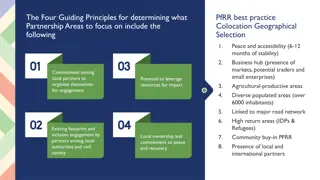Principles of Effective Partnership
Summary of the minimum commitments for participation in the Nutrition Cluster, the origin and meaning of the Principles of Partnership, and how these principles can enhance coordination and accountability to affected populations. Explore the principles of partnership such as complementarity, transparency, results-oriented approach, equality, and responsibility in fostering mutual respect and cooperation.
Download Presentation

Please find below an Image/Link to download the presentation.
The content on the website is provided AS IS for your information and personal use only. It may not be sold, licensed, or shared on other websites without obtaining consent from the author.If you encounter any issues during the download, it is possible that the publisher has removed the file from their server.
You are allowed to download the files provided on this website for personal or commercial use, subject to the condition that they are used lawfully. All files are the property of their respective owners.
The content on the website is provided AS IS for your information and personal use only. It may not be sold, licensed, or shared on other websites without obtaining consent from the author.
E N D
Presentation Transcript
1.5 Working Together Effectively: Principles of Partnership and Mutual Accountability
Objectives Summarize the minimum commitments for participation in the Nutrition Cluster Explain the origin and meaning of the Principles of Partnership. Describe how the Principles of Partnership can contribute to more effective coordination and enhanced accountability to affected populations.
Minimum Commitments for Participation As per the IASC Commitments for Participation in Clusters for Partners (in the Transformative Agenda) They should be regarded as an absolute minimum and a starting point They are not set in stone and should be adapted to each country s context 3
Partner Commitments Willingness to take on leadership (in WGs, sub- national level, etc.) Commitment to mainstream cross- cutting issues (age, gender, etc.) and protection Commitment to Humanitarian Principles and Principles of Partnership Readiness to participate in actions that specifically improve AAP A demonstrated understanding of the duties and responsibilities of membership as defined by IASC Capacity to contribute to Cluster s response planning Active participation Commitment to work cooperatively with other Cluster partners Ensure interpretation Undertake advocacy Committed to staff members 4
Principles of Partnership Complementarity: Build on comparative advantage Transparency: Communication Results-oriented: Coordinate capability & capacity Principles of Partnership Equality: Mutual respect Responsibility: Commit only what can be delivered
Group Work: Principles of Partnership In your group, explain the selected principle of partnership to a representative to a National NGO who has never been involved in the cluster work
Principles of Partnership Equality requires mutual respect between members of the partnership irrespective of size and power. The participants must respect each other's mandates, obligations and independence and recognize each other's constraints and commitments. Mutual respect must not preclude organizations from engaging in constructive dissent.
Principles of Partnership Transparency is achieved through dialogue (on equal footing), with an emphasis on early consultations and early sharing of information. Communications and transparency, including financial transparency, increase the level of trust among organizations.
Principles of Partnership Effective humanitarian action must be reality-based and action- oriented. This requires result- oriented coordination based on effective capabilities and concrete operational capacities.
Principles of Partnership Humanitarian organizations have an ethical obligation to each other to accomplish their tasks responsibly, with integrity and in a relevant and appropriate way. They must make sure they commit to activities only when they have the means, competencies, skills, and capacity to deliver on their commitments. Decisive and robust prevention of abuses committed by humanitarians must also be a constant effort.
Principles of Partnership The diversity of the humanitarian community is an asset if we build on our comparative advantages and complement each other s contributions. Local capacity is one of the main assets to enhance and on which to build. Whenever possible, humanitarian organizations should strive to make it an integral part in emergency response. Language and cultural barriers must be overcome.
Partner Commitments as per the Transformative Agenda Endorse and adhere to cluster coordination aims, objectives and Humanitarian Principles and Principles of Partnership Committed staff member/focal point Align workplans/strategic planning to cluster objectives and strategy Leadership role: possible co-lead of national/sub-national clusters Active participation in strategic advisory groups, technical working groups, collaborative assessments
Partner Commitments as per the Transformative Agenda Providing technical expertise, opinion, debate and feedback on cluster activities and documents; Pro-active information-sharing and dissemination of innovative technical and programming experiences Commitment to mainstream cross-cutting issues (age, gender etc) Commitment to work cooperatively with other cluster partners Undertake advocacy Readiness to participate in actions that specifically improve accountability to affected people
Key Messages: The Minimum Commitments help establish common criteria for participation in the cluster and apply to CLA as well! A commitment to Accountability to Affected People underline the commitments, and can be leveraged to build common approaches to AAP amongst partners The Principles of Partnership help define the ideal culture for cluster coordination. These same principles can apply to our relationships with vulnerable and affected communities. The partner commitments and principles should be reflected in the accountability framework for clusters























